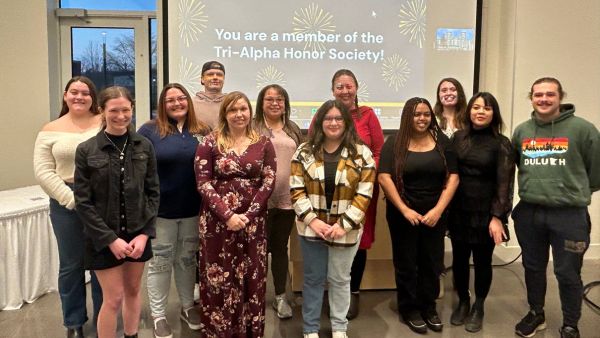November 8, 2024
Recognizing and honoring first-generation students at St. Scholastica
November brings a time of celebration at The College of St. Scholastica as the community recognizes and honors its first-generation college students. Founded as a women’s college in 1912 when higher education was predominantly male, the College has a proud history of promoting educational access and social mobility.
With over 36% of all enrolled undergraduate and graduate program-seeking students identifying as first-generation, this month’s celebrations — an induction ceremony and faculty lecture — honor the achievements of these students and the support provided through five federally-funded TRIO programs, including pre-college and college-level programs.
Tri-Alpha Induction Ceremony
The College is proud to host a chapter of the national Alpha Alpha Alpha Honor Society (Tri-Alpha). Tri-Alpha recognizes academic achievements in first-generation college students, creates enthusiasm for scholarship, promotes leadership and provides support networks for first-generation students within and across college chapters.
The College hosted its annual Tri-Alpha Induction Ceremony on Thursday, Nov. 7, at the Student Center on the Duluth main campus. The event began by awarding Tayler (Boelk) Mercil ’17 the prestigious First-Generation Alumni Award for her outstanding accomplishments. This award honors a first-generation alum whose strengths, resiliency and lived experiences positively contributed to the St. Scholastica community.
Mercil graduated from St. Scholastica in 2017 with a bachelor’s degree in English, during which she was active in various campus organizations, including the TRIO Student Support Services and McNair Scholars programs. She went on to earn a master’s degree in Communication at Western Michigan University, where she now serves as Manager of Recruitment and Outreach, inspiring prospective students with her first-generation journey.
The evening’s highlight included the induction of 55 remarkable undergraduate and graduate students into the College’s Tri-Alpha chapter. Membership in the Tri-Alpha Honor Society provides outward recognition of academic ability and commitment. It also promotes a supportive environment for first-generation college students.
As part of the application to Tri-Alpha, inductees explained their keys to success as first-generation college students. Their reflections highlighted resilience and determination in overcoming challenges, the vital importance of support systems, their desire to be role models for their families, the challenges of balancing multiple responsibilities and an overall sense of grit, resourcefulness and deep purpose in forging new paths for themselves and their families through higher education.
Celebrating National First-Generation College Day
On Friday, Nov. 8, from noon to 1 p.m., the St. Scholastica community is invited to celebrate First-Generation College Day. This year, Dr. Kevin Taber will deliver the “First Lecture,” a lecture he wished he had received in his first college semester. Dr. Taber earned his BA in International Affairs at Murray State University where, with the support of McNair Scholars Program staff and faculty mentors, he was inspired to pursue his PhD in political science. In addition to directing the Political Science and Washington Semester programs, he teaches a wide array of political science and related courses at St. Scholastica.
“The first-generation students at St. Scholastica are not just pursuing higher education; they are shaping the future with resilience, determination and a commitment to breaking barriers. Their journeys are a testament to the power of education to transform lives, not just for themselves, but for their families and communities,” said Matt Hoeschen ’04, director of TRIO Student Support Services. “As a first-generation graduate, I am deeply inspired by the strength, passion and leadership these students bring to our campus. I am excited to celebrate their achievements and look forward to seeing the incredible impact they will continue to make in their academic, professional and personal lives.”


